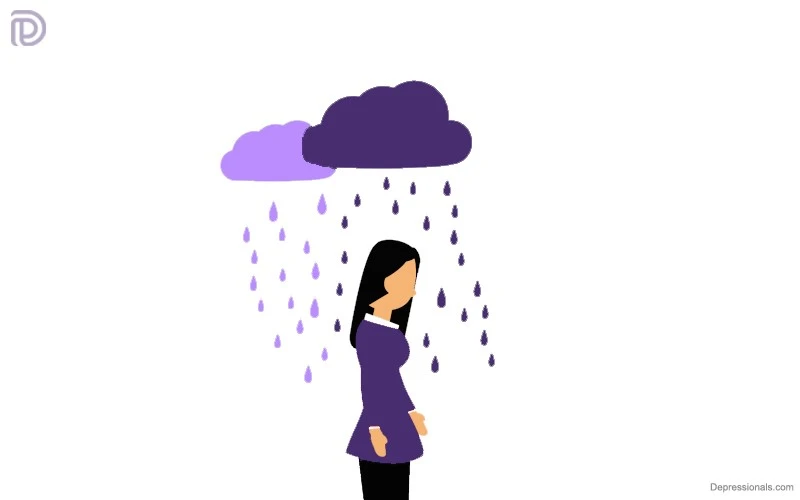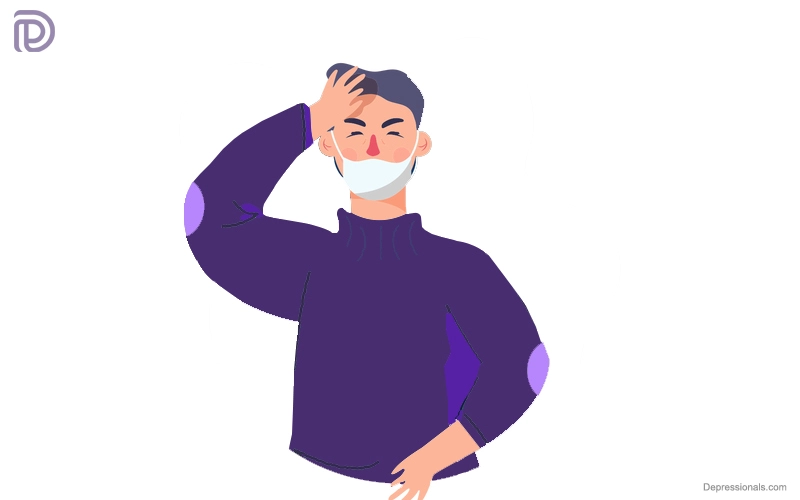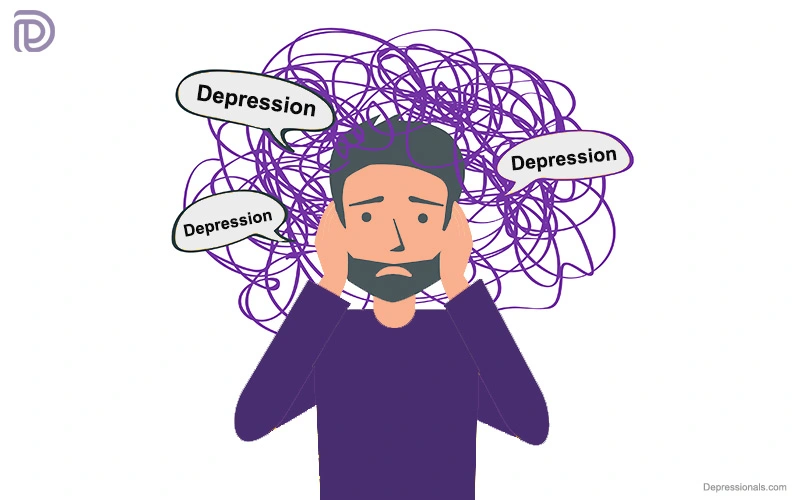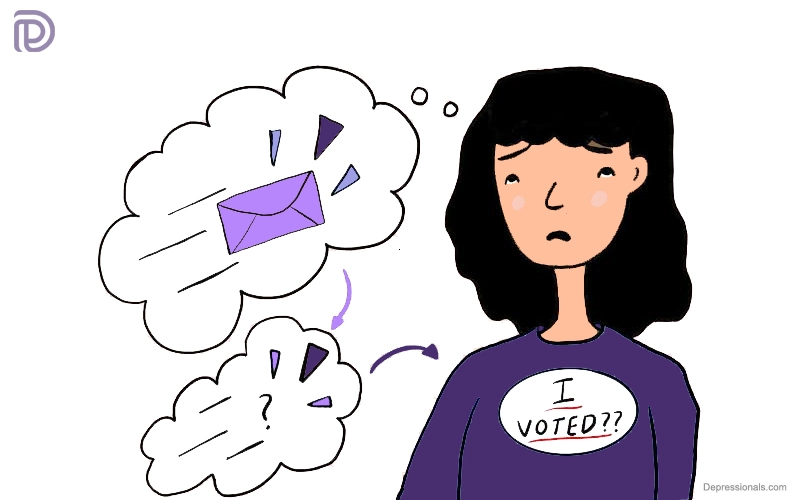A depressive episode is a period of feeling low or exhibiting depression symptoms that last for more than two weeks in the context of a major depressive disorder. To alleviate the symptoms of depression, a person can adjust their thinking and behavior.
There is no cure for depression and symptoms can last for weeks or months. Depressive episodes can last for more than a year less commonly.
Approximately 16.1 million Americans reported at least one episode of major depression in 2015, according to the Anxiety and Depression Association of America.
Here are 12 tips for coping with a depressive episode, as well as symptoms and causes of depression.
Depressive Symptoms
Anxiety or depressive episode can manifest as feeling hopeless, frustrated, fatigued, and giving up on things you once enjoyed.
An episode of depression is marked by more severe symptoms than usual mood swings, such as:
- Sad, hopeless or helpless
- Guilt and worthlessness
- Anxiety
- Irritation or frustration
- Low energy or fatigue
- Restlessness
- Appetite or weight changes
- Inability to enjoy hobbies or socialize as much as once
- Concentration or memory problems
- Sleep patterns change
- Slowly moving or talking
- Death or suicide thoughts, or attempts at suicide
- Aches or pains that appear to have no obvious cause
It takes at least two weeks for people to suffer from these symptoms for most of the day, almost every day.
Read: Situational Depression
Depressive episodes vs. Grief
There is no doubt that grief is the closest thing to a depressive episode (and depression in general) that one can go through. The two are similar in many ways, including a profound and unrelenting sense of loss associated with grief.
However, they differ in both the type of pain they experience and which of their shared characteristics is more prevalent in each situation.
A first point to make is that grief is not seen as a disorder, but as a normal part of living. When one experiences a significant loss, grief is a deep, unrelenting emotional pain that persists for years. Grief may come from the loss of a loved one, from losing one’s social status to financial disaster to debilitating illness, or from the loss of a belief, e.g., a divorce that results in the loss of the belief in a “happily ever after.” Every person experiences loss in some form, and everyone grieves when the things we depend on no longer exist.
The similarities between grief and depression are striking, but why is one considered normal while the other a mental illness? It is one’s unconscious that makes the difference, according to Sigmund Freud, the father of psychoanalysis. The patient’s own mourning, or parts of it, may be hidden from them during depressive episodes, according to Freud. When a person is grieving the death of a grandparent, they may find it unbearable to deal with painful aspects of their relationship. Therefore, they internalize any negative feelings they may still harbor toward their deceased grandparent, turning their frustration, anger and hurt toward themselves. They are kept preoccupied-unconsciously-with the loss they’ve experienced and are never allowed to truly let go of their unresolved energy, weighing them down and draining their emotional reserves. It is believed by Freud that depression is the result of unprocessed, submerged grief.
The main difference between depression and grieving is this inability to cope with it. It is also important to note that there are several differences between the two: according to the DSM-V, depressive episodes are usually associated with low moods and inability to enjoy oneself or feel happy. Conversely, grief is characterized by feelings of loss and emptiness.
Depressive episodes vs. Sadness
Sadness is often a part of depressive episodes, just as it is with grief. It can sometimes be difficult to distinguish sadness from depression when it is accompanied by feelings of longing or lack.
Yet depressive episodes and moments of sadness are distinct, despite their similarities. In the first place, sadness cannot be diagnosed as a mental illness, like mourning cannot either.
Furthermore, sadness typically lasts much longer than the two-week minimum requirement for the diagnosis of a depressive episode.
Depressive episodes can last most or even the entirety of one’s day, whereas sadness lasts only for a very short period.
The intensity of depression’s symptoms and its detrimental effects on an individual’s quality of life or daily functioning make it a mental health issue, but sadness is not as severe, and it usually passes without having a significant impact on one’s mental health.
Twelve tips for coping with a depressive episode
Depression can be treated more quickly if it is addressed as soon as symptoms appear. Changing the way one thinks and behaves can improve the mood of individuals with long-term depression.
Depressive episodes may be easier to cope with if people follow these tips:
1. Track triggers and symptoms
Understanding what triggers a depressive episode might help a person keep track of their moods and symptoms. Early detection of depression may help them avoid a full-blown depressive episode.
Keeping a diary helps you keep track of important events, changes in your daily routine and moods. To identify which events or activities cause specific responses, rate moods on a scale of 1 to 10. Symptoms that persist for more than 14 days should be evaluated by a doctor.
2. Stay calm
Finding out that a depressive episode has begun can be a scary experience. Panic attacks and anxiety are common reactions to the initial symptoms of depression. However, these reactions can lead to depression and worsen other symptoms, such as appetite loss and sleep disturbances.
Stay calm instead. Taking care of yourself doesn’t mean you have to suffer from depression forever.
Depressive episodes can be overcome by anyone who has experienced them previously. During depressive episodes, people should reflect on what they have learned from past experiences.
Stress can worsen if someone does not learn how to look at issues in a more positive light, or if their mental health state is unstable. Meditation and mindfulness can help calm a person. You can find self-help books as well as phone and online counseling.
Read: Stress Management Techniques
3. Accept and understand depression
People can cope with depression by learning more about it. Depression is a real and widespread mental disorder. This does not imply weakness or shortcomings.
The ability to accept the possibility that a depressive episode may occur periodically can help people deal with it when it occurs. Symptoms can be managed with medication, lifestyle changes and therapy.
4. Dissociate yourself from depression

Persons aren’t defined by their illnesses; they aren’t defined by their conditions. Many people find it useful to repeat: “I am not depression, I just have depression,” as soon as depression symptoms begin.
All aspects of who a person is should be recalled. You can also consider it if they are your parent, brother, sister, friend, spouse, neighbor or colleague. There are many different strengths, capabilities and positive traits within each person.
Read: Endogenous Depression
5. Self-care is important
A healthy mental and physical life depends on taking care of oneself. A self-care activity is any activity that helps a person take care of their wellbeing.
Relaxing, recharging, and connecting with others are all modes of self-care. Taking time for oneself is essential to achieving calm and harmony.
Consuming a healthy diet, participating in creative pursuits, and taking a soothing bath are all basic self-care activities. Self-care activities include anything that improves one’s mental, emotional and physical health.
6. Relax your muscles and breathe deeply
Stress relief can be achieved through deep breathing techniques. It is physically and psychologically beneficial to slowly inhale and exhale on a daily basis.
No matter what situation you are in – whether you’re driving, at work or shopping – you can breathe deeply. Numerous apps for smartphones offer guided deep breathing exercises, and many of them are free to download.
A progressive muscle relaxation program can also help those suffering from depression and anxiety. To reduce stress, we need to relax our muscles. Similarly, smartphones can be used to guide progressive muscle relaxation.
We have reviewed a number of meditation apps that may be helpful for people suffering from anxiety and depression.
Recommended: Anxiety Breathing Exercises
7. Challenge negative thoughts
People with depression and other mood disorders can benefit from cognitive-behavioral therapy (CBT). According to CBT, a person’s mood is determined more by their thoughts than by their circumstances.
To change feelings and behaviors, CBT involves replacing negative thoughts with balanced ones. Therapy sessions using cognitive behavioral therapy can be provided by a qualified therapist, however, challenging negative thoughts can also be done without therapy.
The first thing to do is observe how often and what negative thoughts arise. Often, these feelings are expressed as statements such as “I’m not good enough” or “I’m a failure.” Replace those statements with positive ones, such as “I tried my best” or “I am enough.”
Related: Strategies to Overcome Overthinking
8. Practice mindfulness
Every day, take a few minutes to be mindful and appreciate the present moment. A crisp, sweet apple at lunchtime might taste good to you, or you may notice the warmth of the sunlight on your skin as you walk to work.
Being mindful enables one to focus on the present moment instead of thinking about the past or the future.
Studies have shown that regular mindfulness practices can reduce depression symptoms and improve negative reactions to the low mood in people with chronic or recurrent depression.
9. Make a bedtime routine
It is important to sleep well to maintain a healthy mood and mental state. Depressive symptoms can be exacerbated by lack of sleep, and insomnia can be caused by depression. Even on weekends, try to get up and go to bed at the same time every day to avoid these effects.
Get in the habit of going to bed at the same time every night. Begin winding down at 8 p.m. Take a warm bath, drink chamomile tea or read a book. Don’t watch television or consume caffeine. Writing in a journal before you go to bed can also be helpful, especially for those whose racing thoughts keep them awake.
Check all: Sleep Disorders
10. Exercise
Depression sufferers can greatly benefit from exercising. The mood is improved by chemicals called endorphins released by exercise. A study analyzing 25 studies on exercise and depression found that exercise significantly reduced symptoms of depression.
11. Don’t drink alcohol
Depressive episodes are triggered or worsened by alcohol, and alcohol use can trigger or worsen existing depression. Some depression and anxiety medications can also interact with alcohol.
Related: Tobacco Use Disorder
12. Record the positives
The negative aspects of a depressive episode are often overlooked and the positive aspects are overlooked. To counteract this, keep a gratitude journal or a positivity journal. Keeping a journal like this can help you gain self-confidence.
Make a list of three good things you did today before going to bed. You can meditate regularly, go for a walk, eat a healthy meal and so much more.
Asking for help
You don’t have to face depression alone; it can be challenging. It is very important to ask for help when you are experiencing a depressive episode.
Seek help from:
- Friends and family: If you are experiencing depression, tell your family and friends about how you are feeling, and ask for support where you need it.
- A doctor: It is important to consult a doctor who can make a diagnosis and recommend treatments. According to research, early treatment should be tailored to the specific needs of the individual.
- A therapist: Counseling or psychotherapy can be beneficial. Low moods and negative thoughts can be addressed with talk therapy. Moreover, a therapist can teach people how to cope with future episodes of depression.
- Support groups: You can find a depression support group in your local area. Talking to someone who is going through the same thing can be helpful.
Depression sufferers can also contact support lines and crisis hotlines. Keep important numbers on your cell phone, so you’ll always have access to them.
Here are some helpful numbers in the U.S.:
- You can reach the National Suicide Prevention Lifeline at 1-800-273-8255 (1800-273-TALK)
- Crisis Text Line: Text HOME to 741741
- Local Samaritans branch
- 911
Support groups and helplines similar to these are also available in other countries.
Related: How to Help Someone with Depression
Types of depression
The most common form of depression is a major depressive disorder. Depressive episodes can also be caused by other types of depression with similar symptoms. Some of these are:
The duration of persistent depression is at least 2 years. There may be a variation in severity during this period, but symptoms are always present. One in five American adults may suffer from persistent depression during a year.
Psychotic depression results in symptoms of both psychosis and severe depression. The experience of hallucinations and delusions may occur. Approximately four people in a thousand are affected by psychotic depression.
Bipolar disorder is a type of mood disorder akin to major depressive disorder. Mania or hypomania may also be experienced by someone with bipolar disorder. Approximately 2.8 percent of U.S. adults may develop bipolar disorder each year, according to the National Institute of Mental Health (NIMH).
Postpartum depression occurs after pregnancy or during pregnancy and can cause major depressive symptoms. Approximately 15 percent of new mothers suffer from this condition.
Seasonal affective disorder (SAD) is a depressive disorder that manifests during the winter season. In accordance with the American Academy of Family Physicians, no more than 4 to 6 percent of the population is estimated to suffer from SAD, with another 10 to 20 percent suffering from a milder form of it.
Related: How to Overcome Depression
Possible triggers
Many factors can contribute to depression, which is a complex condition. The majority of people experience a depressive episode only when an event triggers it. Even if a person is predisposed to depression, stress works to trigger the condition.
Among the possible triggers are:
- Routine changes
- Sleep disturbances
- An unhealthy diet
- Work, home or school stress
- Isolation, loneliness or feeling unloved
- Being abused or mistreated
- Erectile dysfunction, Alzheimer’s disease or stroke
- Drugs that treat high blood pressure and certain antibiotics
- Loss of a loved one or divorce are significant stressful life events
- An accident, assault, or other traumatic events
The important thing to remember is that not all depressive episodes will be triggered by something obvious.
Related: Depression and Divorce






Amazing! This blog looks exactly like my old one! It’s on a totally different topic but it has pretty much the same page layout and design. Superb choice of colors!
I am delighted that I detected this site, precisely the right information that I was searching for! .